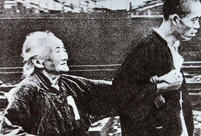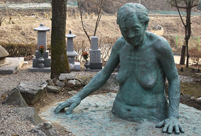 Fighters of Lanzhou MAC in confrontation training
Fighters of Lanzhou MAC in confrontation training
 3D printing to trigger third industrial revolution
3D printing to trigger third industrial revolution
 Top 10 brands that win rich women's hearts
Top 10 brands that win rich women's hearts
 Deng Xiaoping: 'I have a clear conscience all my life'
Deng Xiaoping: 'I have a clear conscience all my life'
 Xi Jinping: 'The people are our strength'
Xi Jinping: 'The people are our strength'
 Amazing cliff diving in cold winter
Amazing cliff diving in cold winter
 Enjoy Sochi 2014 in slow motion
Enjoy Sochi 2014 in slow motion
 University student sentenced to death for poisoning roommate
University student sentenced to death for poisoning roommate
 Chinese lunar New Year celebrated in San Francisco
Chinese lunar New Year celebrated in San Francisco
BEIJING, March 6 -- Six decades after China's first National People's Congress (NPC) was convened, the world's largest legislature is more comfortable with critical lawmakers, negative ballots and shelved bills.
And its receptiveness to questioning voices is joined by its remit becoming more substantial.
The vigor of the system lies in its persistent willingness and capacity to improve itself.
Legislative bodies at national and local levels have been striving to shake off the perception of them being bureaucrats who do little more than "rubber stamp" decisions. And their efforts have been perceived.
Last year, the balloting on the new line-up of the top legislature's environment protection and resources conservation committee saw 850 opposition votes and 125 abstentions, around a third of the total votes.
Such a strong opposition reflected wide dissatisfaction with the environmental issues from the public.
What is happening in China's congresses would have been unimaginable decades ago, when lawmakers meekly chimed in with the government to show their loyalty.
Opposition and challenges now serve as checks and balances for almost every important legislative decision.
One NPC official observed that, after the legislature's approval of reports and law amendments, lawmakers now no longer applaud as frequently and as hard as they used to.
It reflects a change not only in the legislators' understanding of their relationship with the government, but also in their power consciousness.
It is such awakening of power consciousness that drives the people's congress system to improve itself.
As the NPC annual session is ongoing, China's 600 million netizens have poured in a large number of suggestions in the cyberspace, urging their deputies to have their voice better heard and considered in the parliament.
Zhao Zhengyong, secretary of the Shaanxi Provincial Committee of the Communist Party of China and also an NPC deputy for the northwestern province, told media that during the parliamentary session he browses the Internet every night to see netizens' suggestions and criticisms.
Zhao is not alone. More lawmakers are bringing the netizens' concerns and suggestions to the parliamentary halls, discussing them with their fellow deputies.
The Internet and new media channels, major platforms for rising critical voices, are only one of many challenges and changes that the 60-year-old People's Congress is facing.
Only through ceaseless self-improvement will the system bring vitality to itself, making it more justified to be China's fundamental political system.
In January, top legislator Zhang Dejiang urged the congress system to make itself "keep pace with the times" through nonstop improvement.
Neither is there a perfect political system nor a universally fitting one. For a country, the fittest is the best.
The unique Oriental way of empowering its people, which has seen the nation's drastic transformation to the world's second-largest economy, has been an effective means of governing the world's most populous country.
But the system, like its Western counterparts which normally feature partisan politics and a power division but sometimes end up with endless parliamentary bickering and money-driven liberal democracy, is not perfect.
More need to be done for the country's legislators to wield the law-making and supervisory power vested in them by the 1.3 billion Chinese.
The latest reminder was the massive election fraud in central China's Hengyang City involving 56 lawmakers elected to the provincial people's congress on a tide of 18.1 million U.S. dollars in bribes.
One day before this year's NPC session opening on Wednesday, its spokeswoman vowed "zero tolerance" of election fraud. That shows the willingness to improve. The resolution needs to be translated into concrete actions.
It is fair to say that whether the 60-year-old system will further China's success story in the next 60 years hinges on its willingness to become better.
 Chaihe village, pure and peaceful fairyland in snow
Chaihe village, pure and peaceful fairyland in snow Belgians warmly welcome arrival of China's giant pandas
Belgians warmly welcome arrival of China's giant pandas Female marines receive tactical training in NW China
Female marines receive tactical training in NW China Blood memory: Nanjing Massacre in 1937
Blood memory: Nanjing Massacre in 1937 Top 10 pure beauties in showbiz
Top 10 pure beauties in showbiz British WWII veteran: I can't forgive Japan
British WWII veteran: I can't forgive Japan Tongban's dream of prosperity
Tongban's dream of prosperity Chinese frigate Yancheng holds drills in Mediterranean Sea
Chinese frigate Yancheng holds drills in Mediterranean Sea A visit to comfort woman's home in South Korea
A visit to comfort woman's home in South Korea Fairyland? Qingdao in sea of clouds
Fairyland? Qingdao in sea of clouds Top 10 most handsome faces in Asia in 2013
Top 10 most handsome faces in Asia in 2013 Female celebs with beautiful long legs
Female celebs with beautiful long legs Cat 'guardians' in Forbidden City
Cat 'guardians' in Forbidden City Large numbers of ancient coins excavated in Inner Mongolia
Large numbers of ancient coins excavated in Inner Mongolia Leisurely life beneath Zhonggulou, where time travels slower
Leisurely life beneath Zhonggulou, where time travels slowerDay|Week|Month